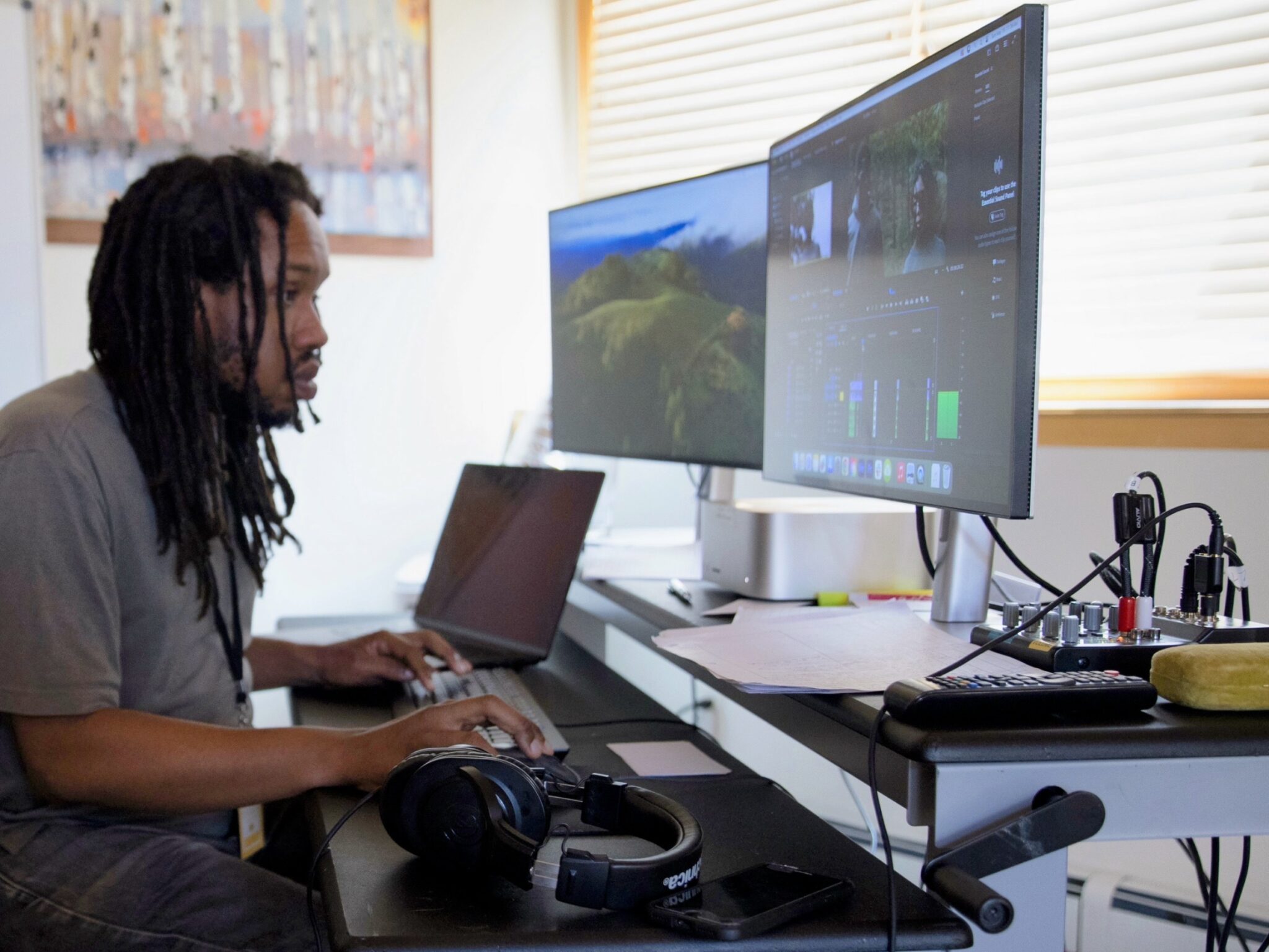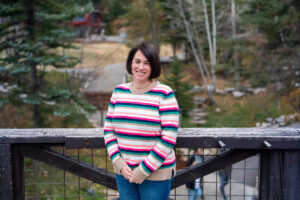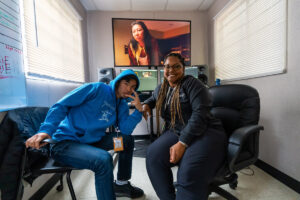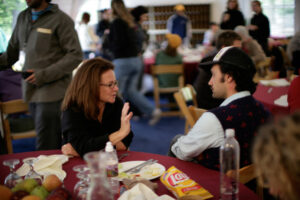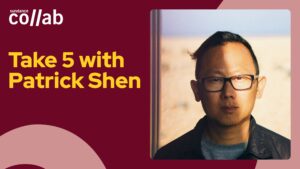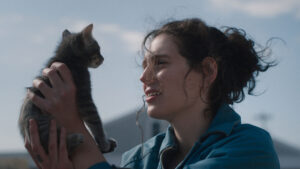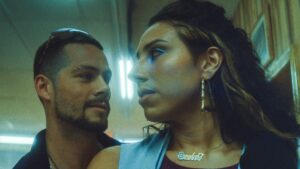“I am still processing what it means to be part of the Sally Menke Fellowship and the Sundance Directors Labs,” says Troy Lewis from a condo-turned-edit-bay at the Stanley Hotel in Estes Park, Colorado. The writer-editor is taking a pause from prepping for his upcoming turn as the editor for two Directors Lab fellows (Keisha Rae Witherspoon and Diana Peralta) when we get a chance to connect. Right out the window is the Rocky Mountains, an iconic reminder of compounding history and endless evolution for Lewis, who’s the latest entry in the growing legacy of the Sally Menke Memorial Editing Fellowship.
“One of the first things that happened after they informed me that I was selected is I got emails from the dozens of [alumni] of the Sally Menke Memorial Editing Fellowship,” Lewis recalls. “Just seeing so many names of editors in the past who have shaped my view of film, and what it can be, were just so friendly and welcoming. That’s continued on to my arrival at the lab, and my work with the director so far.”
For 14 years, Sundance Institute has been celebrating the remarkable career and legacy of editor Sally Menke through the Sally Menke Memorial Editing Fellowship. With past fellows including Joseph Krings (Winner, Captain Fantastic), Daysha Broadway (Whitney Houston: I Wanna Dance With Somebody, Your Monster), Monica Salazar (Bardo: False Chronicle of a Handful of Truths, Honey Boy), and Debbie Berman (co-editor Black Panther and Spider-Man: Homecoming), Lewis is joining a tight-knit group of storytellers and craftspeople who continue to shape the future of cinema through the art of editing.
Set up by Sundance Institute with support from Menke’s family, the fellowship supports emerging editors who have edited up to four fiction or nonfiction feature films and are committed to continuing a career in editing, passionate about collaboration and the creative process, and open to exploration and experimentation in the editing room. The fellow receives a yearlong mentorship from two veteran editors and kicks off the fellowship at the Sundance Directors Lab editing scenes for two fellows.
While Lewis’ fellowship just started a couple weeks ago, his 2024 has already been shaped by the global community of the Sundance Institute. The Chicago–based artist started his year in Park City, Utah, at the Sundance Film Festival celebrating the premiere of Daughters, which he was the editor and co-writer of. That documentary went on to win the Audience Documentary Award and the Festival Favorite Award, and will be debuting on Netflix in August.
“I’m really excited to connect with the alum after the lab because they all referred to it as a life changing experience,” Lewis continues. “That’s been true so far with the creative advisors at the Directors Lab and I’ve already deeply connected with the two directors I’m working with…”
Below learn more about how Lewis became an editor, how he stays inspired, his experience on Daughters, and more.
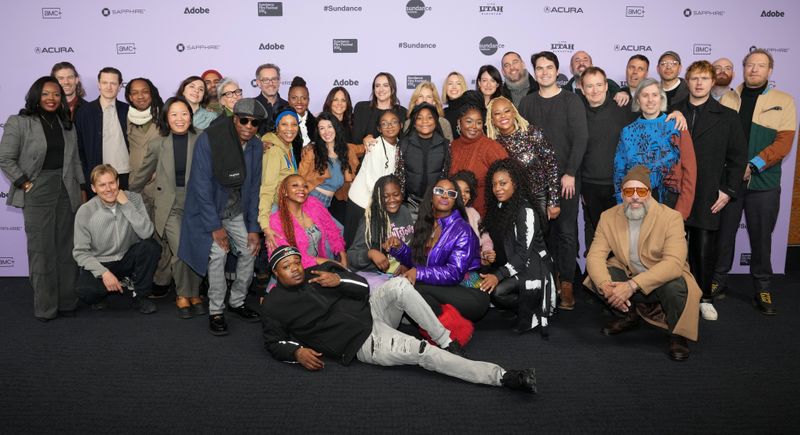
On being a part of the Sundance community:
Being at the Sundance Film Festival in January was already an overwhelming experience and for the premiere of our film [Daughters] was the best audience we could ever ask for and to further join that community through the Sally Menke Fellowship is just such an honor.
I’m based in Chicago. So one of the things I talked about in my application was the excitement to be part of a larger community that’s more largely represented in LA and New York and to find mentor figures and editing and filmmaking and a community that welcomes you with open arms and it’s so exciting to be a part of that.
On his path to becoming an editor:
I was always interested in filmmaking as a child. My interest in film began more so in writing than any direct filmmaking role. And during college [at Northwestern] when I was studying English and film, I slowly started to notice an overlap between the art of editing and the art of writing. And I love the idea of being able to tell a story through images and mixture with words. That interest continued as I became involved in editing and documentary and something I love now is moving between narrative film and documentary film.
I think I get energy from both. I like to pull my storytelling skills and short story writing skills when I enter a documentary which often starts more formless than narrative. In narrative, documentary allows me to look deeper and look for the spontaneity of moments and performances and the parts of film you can’t control and try to bring those into the narrative.
What part of your work gets you up in the morning?
Something I’ll always appreciate that my documentary work has given me is to take every clip, every take in a way as its own object separate from the script.
I like to look at a performance and say, OK, they’re reading the scripted words, but also this is a human performing in front of a camera [and they’re not in perfect control of their bodies.] I like to look for little tics in the performance, little moments, mistakes even, and say what story does that tell and also how can that story tie into this larger script I’m working on.
On the experience of Daughters.
The documentary was definitely a once in a lifetime experience and was my first cold call from a producer ever.
I had worked the previous year on a Fred Hampton short documentary that was tying in with the release of Judas and the Black Messiah. One of the producers on Daughters saw that and reached out checking my availability and sent a couple of clips of interviews with the girls. Just watching those videos for the first time, I was like, I’m ready to shape my life for the next few years around this.
For the next two years I was working full time on editing for the Daughters documentary. I was based in Chicago. The director was based in LA. I would spend months in LA at a time, come back to Chicago for a few weeks, then go back.
We just kept shaping this story and it was so exciting and an honor also to work as a co- writer and really be able to shape the arcs and narratives of the girls and the fathers and find those stories and also collaborate with the director and also the girls over pickups and dream sequences exploring their interiority.
You can follow him on Instagram at @troyjlewis and on vimeo at vimeo.com/troyjlewis




